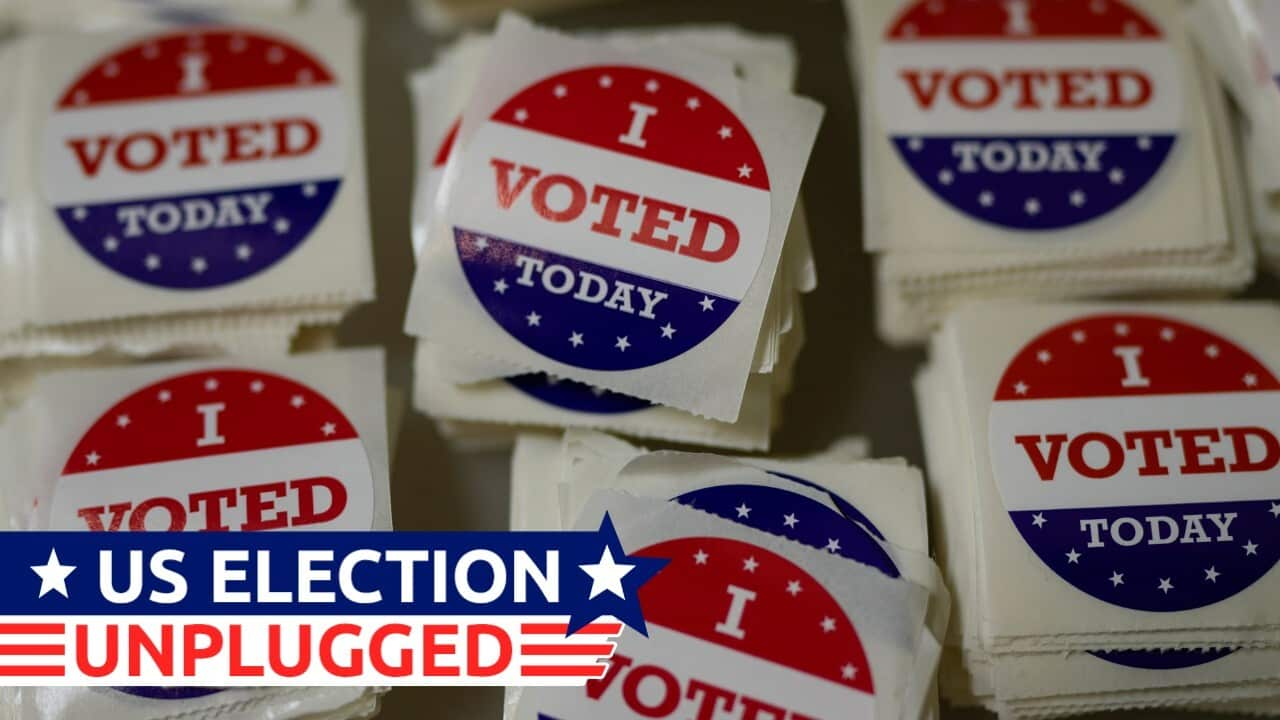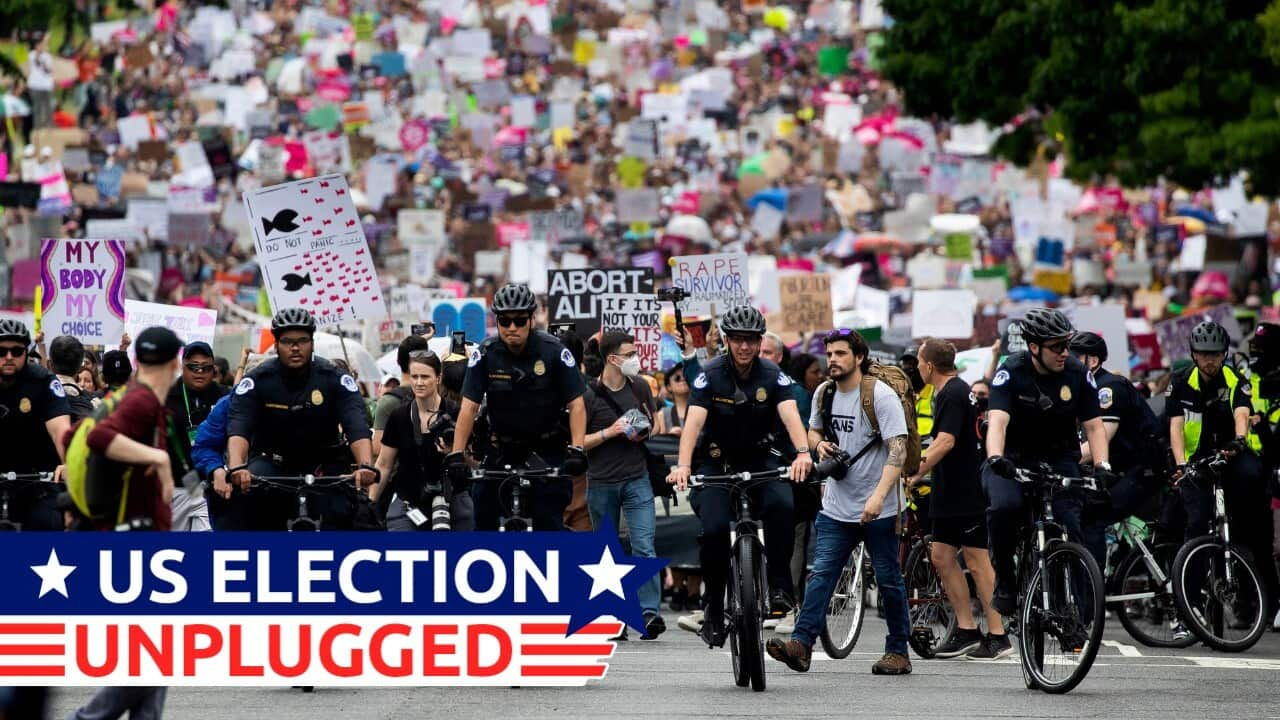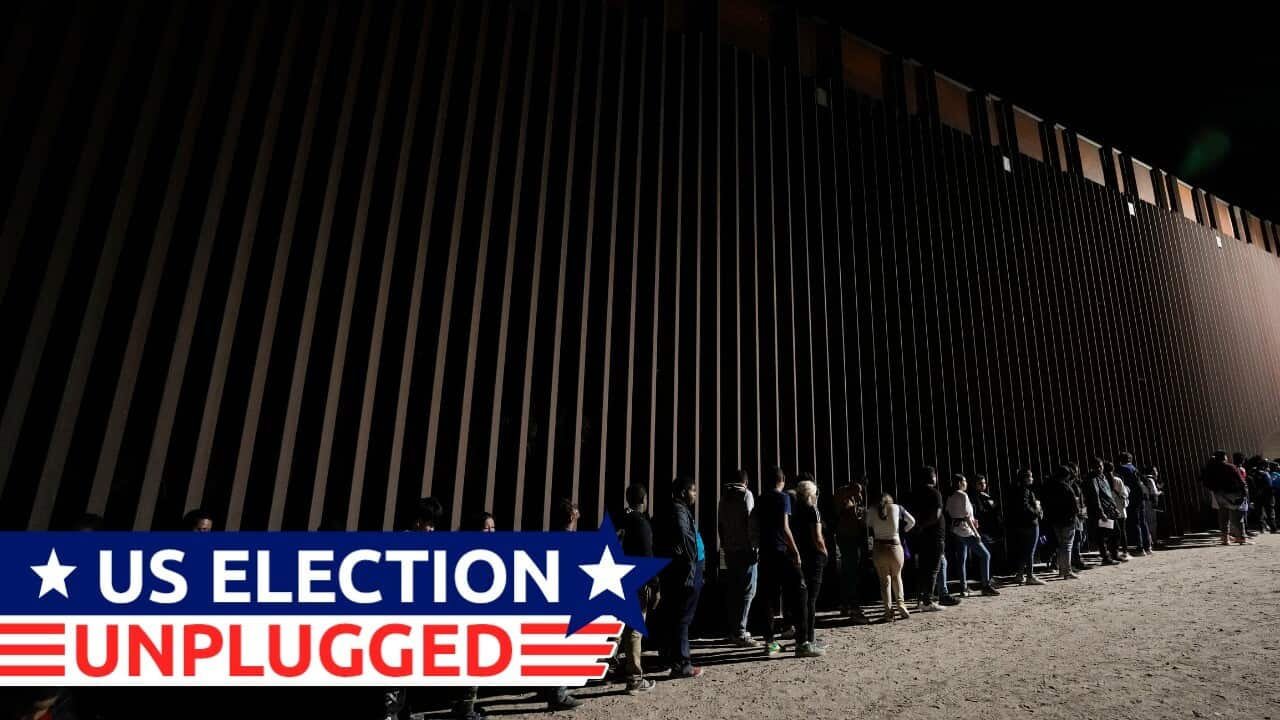TRANSCRIPT
In this episode, we're looking at foreign policy.
"For 320 days, we've stood together, demanding to enforce our laws on friend and foe alike, to reach a ceasefire, end the killing of Palestinians, free all the Israeli and Palestinian hostages, and to begin the difficult work of building a path to collective peace and safety. Our party's greatest strength has always been our ability to unite. Some see that as a weakness, but it's time we flex that strength."
That was Ruwa Romman, a Georgia State Representative and Palestinian-American woman.
The comments were from a speech that Ms Romman intended to deliver on the stage of the Democratic National Convention in August; however she was told that the Kamala Harris presidential campaign had denied her request.
Her words have cut to the heart of what has become the defining foreign policy issue for American voters this election cycle - their country's support for war in the Middle East.
“Let's commit to each other, to electing Vice President Harris and defeating Donald Trump, who uses my identity as a Palestinian as a slur.”
“He's become like a Palestinian but they don't like him because he's a very bad Palestinian, he's a weak one. Senator Schumer, I've always known him, and he's become a Palestinian. He's a Palestinian now.”
The comments from Trump aimed at Jewish senator Chuck Schumer and President Joe Biden in a CNN debate have defined his relationship to the Palestinian people, outraging a number of Americans.
But regardless, it's an issue that the Democratic party and Vice President Kamala Harris have much more to answer for and much more to lose from politically.
“What is happening in Gaza reflects a genocide in the making.”
While traditional wisdom may have it that domestic issues such as the economy, abortion and crime are more consequential for the presidential election, the Biden administration's ongoing support for the Israeli military despite accusations of genocide in Gaza may prove to be especially costly.
As Bruce Wolpe, a senior fellow at the United States Studies Centre, says, it could cost the Democrats the key swing-state of Michigan.
“Michigan has the largest Arab and Muslim-American population in the country of any state. Biden carried Michigan by 150,000 votes. There are a hundred thousand Arab and Muslim-American voters, and they are frankly livid over Gaza and over Lebanon. Not dissimilar from how people in Western Sydney feel about what's going on. And that is absolutely understandable. They're not going to vote for Trump because Trump is anti-Muslim, but it means they may not vote. And in an election where Biden wins the state by 150,000 and a hundred thousand, stay home, who knows?”
Democratic-leaning voters in Michigan like Palestinian-American Hind Omar say their community will likely withhold support unless Kamala Harris can indicate a change in policy towards Israel.
“The current administration, is making it extremely difficult and a moral dilemma for me and us to endorse and give our vote. And I really do want to give my vote to that party -- being the Democratic Party. And I really do want my community to support the Democratic Party. But I also understand that a concession needs to be made.”
A report from Brown University estimates the United States has spent a record amount of at least 18 billion US dollars on military aid to Israel since the October 7 attack last year when roughly 1,200 were killed and 250 people taken hostage.
These American weapons have fuelled Israel's devastating assault on Gaza which has damaged or destroyed most buildings in the coastal enclave and killed almost 43,000 Palestinians including nearly 17,000 children in attacks like this one according to the Gaza Health Ministry.
A June poll from CBS showed 61 per cent of Americans think the U-S should stop arming Israel including 77 per cent of Democrats, with a further poll from Data for Progress and Zeteo suggesting most Democrat voters believe Israel is conducting a genocide.
So then, where does Kamala Harris stand on the Middle East and the Biden administration's flow of weapons to Israel?
Well, it's a little bit complicated but so far she's not looking to rock the boat and has pledged to always support Israel.
CNN's Dana Bash asked the Democratic nominee about a potential change in approach.
BASH: "Would you do anything differently? For example, would you withhold some weapons shipments to Israel? That's what a lot of people on the progressive left want you to do."
HARRIS: "Israel has a right to defend itself and how it does so matters. Far too many innocent Palestinians have been killed. Let's get the ceasefire done."
BASH: "But no change in policy in terms of arms and so far?"
HARRIS: "No. We have to get a deal done.”
The United Nations says Israel's assault on the Gaza Strip has far exceeded any notion of self-defence with a UN inquiry accusing Israel of the crime of extermination in October due, in part, to what they called the military's "relentless and deliberate attacks on medical personnel and facilities".
In the midst of a nation-wide protest movement sweeping the country, the Vice President has attempted to strike a more sympathetic tone than Biden.
“We must reunite the hostages held in Gaza with their families. And, to that end, we must work to relieve the immense suffering of innocent Palestinians in Gaza who have experienced so much pain and loss over the year.”
With more Israeli attacks on Yemen and Syria, an ongoing invasion and air bombardment of Lebanon, and the threat of a severe escalation with Iran after back-and-forth missile barrages, CNN's Ben Wedeman says US diplomatic efforts have utterly failed.
“This is a regional war. This situation is increasingly dangerous and out of control and there's nobody at the wheel in the White House.”
Americans and - in particular - Democrat voters are looking to Harris for a way out of further catastrophe.
But Bruce Wolpe, who has worked with Democrats in US Congress during the Obama administration, says her policy is likely not going to live up to the hopes of Joe Biden's critics.
“I think there's going to be more emphasis on Palestinian issues, not only the welfare of people who have suffered horrifically in Gaza, but what the future is, and also moving to two states. And so I think she's going to have just more attention and public concern about the future of Palestine. And so it's not a change in policy, it's a change in emphasis. That's my reading of it.”
And, while Harris has attempted to walk the tightrope between supporting the Israeli military and acknowledging the suffering of Palestinians, Donald Trump has taken... a different approach.
“There's nobody more pro-Israel than I am.”
He's sought to distinguish himself from the Biden administration as an even more staunch ally of Israel.
“If we don't win this election, Israel - in my opinion - in a period of two to three years will cease to exist. It's gonna be wiped out, it's what's gonna happen. He said the only one who wants to keep going is Hamas. Actually, Israel is the one and you should let them go and let them finish the job.”
His support for Israel to, as he put it, "finish the job" in Gaza and continue its military operations elsewhere seems to conflict with an image that Trump's supporters have of him as an anti-war candidate.
“So what I'd like to see is us not being involved in a bunch of world wars. I'd like him to be back so we can have peace in the world and not have all these proxy wars in places like Ukraine and Israel. For one, no new wars were started under him.”
Trump has been keen to capitalise on this image of himself as a figure of peace as seen at a Fox News town hall in January.
“I had no wars. I'm the only president in 72 years, I didn't have any wars.”
Now, is that true? Well, no.
It's true that he didn't start any new wars but the war in Afghanistan was still raging, dozens of soldiers died in conflicts in Iraq and Syria against the so-called Islamic State group and he assassinated Iranian General Qasem Soleimani, pushing Iran and the US closer to war than ever.
Despite this, his peaceful dove pitch has worked, with Trump rising in the polls, with swing-state voters telling the Wall Street Journal this October that they trust the former president to handle both the Middle East and Ukraine better than the Democrats.
While the Ukraine war remains a marginal issue for voters, Trump claims Russia never would have invaded if he was president and he could end the war in as little as a day.
“This is a war that has to end and we're gonna get that war ended. I'm gonna try, and I think I can, get it ended as president-elect. In other words, before I even take over the White House. We've gotta stop the people from dying.”
Meanwhile, Kamala Harris says she's also looking for peace but alludes to President Trump's quick peace plan as more of a pathway to Ukrainian surrender.
“We must work with the international community to secure a just and lasting peace. There are some in my country who'd instead force Ukraine to give up large parts of its sovereign territory. These proposals are the same of those of Putin. They are not proposals for peace. They are, instead, proposals for surrender.”
And beyond the wars the US is involved in, the one key foreign policy agenda item for Kamala Harris and Donald Trump is combatting the rise of their main geopolitical rival and one of Trump's favourite topics...
“China. China. China. China. China.”
...yes, that's right: China.
Kamala Harris says a signature policy of President Joe Biden and one she intends to take forward has been the revitalisation of US manufacturing.
She says this has been key to ensuring the U-S holds its competitive edge over China.
“We created 730,000 manufacturing jobs and announced the opening of more than 20 new auto plants in the United States. And we did it by investing in American industry and American workers. And I want to make sure that America, not China, wins the competition for the 21st century.”
Meanwhile, Trump has pledged to increase tariffs on Chinese goods such as electric vehicles entering the U-S market and undercutting American products.
He believes it will help American producers compete while making China pay their fair share for exporting products to America.
But experts say that's not exactly how tariffs work.
Professor Christopher Tang, a supply chain expert from UCLA told Voice of America that U-S companies are the ones that pay tariffs.
“The truth of the matter is that the import tariffs are paid by the US firms. When companies are facing high import tariffs they have two buttons to push. One is pass the high import costs onto consumers and the other one is to squeeze the Chinese factories to lower the price.”
Professor Tang says the likely effect of the latter option is that China will ship parts to other countries before being exported to the US to skirt such measures.
“China actually shipped a lot of components and parts to Vietnam, to India, for final assembly. And those end products actually are actually still importing into the U-S as well. So, therefore, the total effect on China is that they actually export more but they're not exporting to the US directly.”
Most economists say tariffs raise prices for consumers with trade analysts from the American Action Forum finding Americans bore the brunt of tariffs introduced during Trump's presidency, forking out about 48 billion US dollars.
Half of that was paid by firms importing Chinese components for products that were then made in the US.
Ok so, Kamala Harris and Donald Trump are both attempting to position themselves as defiant in the face of China and as figures of peace in an increasingly hostile world.
However, the Biden administration's ongoing arming of Israel and championing of Ukraine has dampened much of Harris' appeal to anti-war voters, with Gaza potentially costing them the key state of Michigan.
Trump promises to bring both wars to an end immediately and to confront China on the issue of trade, however the substance of these policy proposals appears rather lacking.
So, will voters prefer the tough rhetoric from the former president or will they buy Kamala Harris' pitch for peace and a resilient U-S workforce.
We'll find out very soon.
I'm Sam Dover and you've been listening to 'US Election Unplugged' - a podcast series by SBS News.
You can follow along with the rest of our episodes on the SBS News app, Spotify, or Apple podcasts as we give you the tools to understand key issues in the upcoming election.
We'll catch you in the next episode on electioneering.













